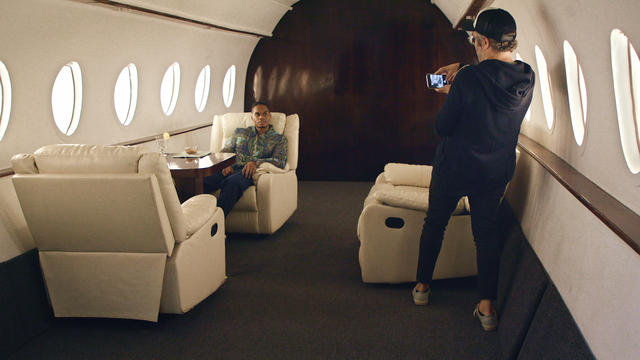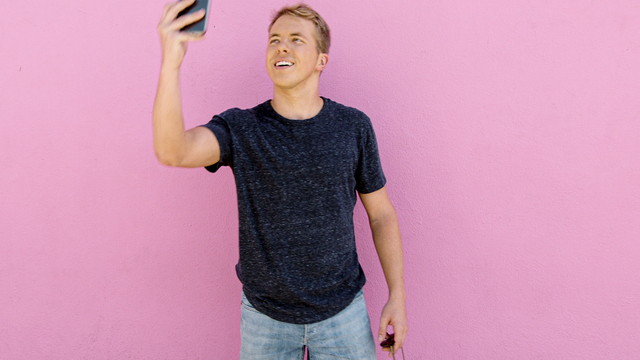“Do you want to be famous?” This is the question, posed in an open casting call, that drew thousands of young people to audition for a role in HBO’s Fake Famous. (Never mind that it is also the implied question of virtually every open casting call.) Framed, like many of the most exploitative reality-TV shows, as a social experiment, this disappointingly superficial documentary sends three strivers culled from the mass of wannabes on a quest to become successful Instagram influencers. Not only does its director, tech journalist Nick Bilton, fail to deliver fresh insight into the mechanisms of social-media celebrity, but he also ignores salient, generationally specific issues—of identity and especially of economics—that arise in interviews.
As articulate and attractive young adults, all three participants meet the basic requirements for influencer status, despite their initially paltry follower counts. Dominique is an aspiring actor who radiates down-to-earth warmth and subsidizes her work in student films with a day job hawking athleisure. One of the first things we learn about her is that she’s resisted pressure, in auditions, to agree to nudity and simulated sex. Muscular and confident, Chris is a budding fashion designer who moved to L.A. from Arizona in hopes of growing his custom-clothing label. He also works retail. Finally, there’s Wylie, who relocated from Atlanta in pursuit of a livelier gay community. A tender, anxious sort, he’s assisting a real estate agent while searching for his purpose in life.
One problem with Fake Famous is that, clocking in at under 90 minutes, it barely gives viewers a sense of what the subjects are like as people. Another is that, even as an episode of MTV’s defunct teen self-actualization reality series Made, it would feel a bit lazy. Bilton raises the question of what it means to be famous in the age of social media, when more than 100 million Instagram users boast six-figure follower counts, without ever really answering it. Instead, he settles for purchasing fake, bot followers for Wylie, Dominique and Chris; staging photo shoots to create the impression that they’re lounging in some exclusive location; buying a round of fake likes and comments for the resulting “content”; and repeating the cycle regularly.

As talking heads who range from internet-culture reporters to social-media marketing moguls explain, an entire gray-market industry has grown up around would-be influencers who have the money to fake it until they make it. You can pay to simulate just about every key metric of Instagram fame. Want people to think you’re flying private? There’s a room set up to look like the interior of luxury jet; it rents for $50 an hour and is often fully booked (though this is L.A., so maybe some of those appointments are for film shoots?). None of this will come as a surprise to anyone with a casual awareness of the influencer economy. Movies like Ingrid Goes West, reality shows like Netflix’s The Circle and even Instagram’s homegrown satirists (satfluencers?) have covered similar ground, often with more insight and humor. And so this documentary that promises a fresh interpretation of youth culture comes off as being slightly behind the times—an impression exacerbated by its focus on Instagram influencers, to the exclusion of the newer cohort of musicians, dancers and other creators making more substantive contributions on TikTok.
Without clarifying what success might look like in the context of an experiment that catapults participants into a simulation of fame without any regard for their discrete personalities, ambitions, interests or talents, Bilton is left with little to do besides rail against a deceptive, self-perpetuating star system and the tech giants that allow gross abuses of their platforms because, of course, they’re making more money off this stuff than anyone. There’s a montage of pint-sized influencers that, while technically wordless, veritably screams won’t somebody think of the children? Finally, in an epilogue that strains for relevance, the backlash to influencers who blithely posted #ads during the early months of the pandemic, then moved on to a summer of staged selfies at Black Lives Matter protests, is treated as conclusive evidence that this is, indeed, a soulless vocation.
But that much is obvious. What’s harder, and what would have made for a more worthwhile film, is to explain why such vapidity appeals to young people. Fake Famous doesn’t pause to explore why the only subject who levels up to free jewelry and gadgets and vacations is Dominique. Could her success have something to do with the gender dynamics of influencer culture—where pretty content creators now occupy the niche supermodels carved out a few generations ago—or the value society places on women’s looks, regardless of whether they choose to monetize them? (Framing Britney Spears, a special episode of FX’s The New York Times Presents series that airs on Feb. 4, is a more insightful, if not groundbreaking look at gender and fame.) Is there a reason why the B-roll Bilton shows us of people snapping selfies and rocking free swag is so heavily skewed toward women? And could it be that Dominique is landing more acting jobs now because her Instagram account showcases her genuine talent for inhabiting a role? Bilton doesn’t seem curious about this. Or about what Chris’ resistance to promoting an inauthentic version of himself has to do with his identity as a Black, male fashion designer. Or about whether Wylie’s retreat from Instagram after a nasty interaction with a follower speaks to insecurities bred within what he describes as a judgmental gay social scene. Identity politics are an essential lens through which young adults view themselves, yet such issues barely come into this examination of how young people market those selves as products.

Even more puzzling is the film’s lack of engagement with the economic realities that drive influencer culture, despite the many openings the subjects give Bilton for that kind of analysis. Though their class and educational backgrounds aren’t entirely clear, we know that Chris, Dominique and Wylie have plenty going for them: creativity, motivation, strong social skills. We also know they’re outsiders in a city flush with entertainment-industry dollars, who are supporting themselves in jobs they don’t find fulfilling and that can’t possibly pay well. “I would much rather be an influencer than have to work at a restaurant,” says Kenzie, a “micro-influencer” who shows up to collaborate with Dominique. Because he can’t take time off for photo shoots, Wylie has to lie about where he is to a boss who is habitually rude to him. When he gets a better gig, his desire to court fame and validation on social media fades: “Now that I don’t have that stress, I just feel so much more in my body,” he explains.
The idea that fame could be an escape—from drudgery, dues-paying and, in no small number of workplaces, abuse—predates Instagram by at least a century. But there’s reason to believe that the generation currently entering the workforce feels a greater sense of urgency than most to hustle their way out of the rat race. Pew reports that, while Generation Z is “on track to be the best-educated generation yet,” young adults make up a disproportionately high share of low-wage service workers (which is why the pandemic has hit them particularly hard). Minimum wage has remained static at $7.25 since 2009; American workers are putting in more hours and receiving fewer benefits from their employers; labor union membership has dropped precipitously in recent decades; and the job market is likely to keep tilting toward the service sector as the decade progresses.
When, within the first few minutes of the film, Bilton grimly relays the finding that more kids now want to grow up to be “famous influencers” than to hold any other job, the implication is that this indicates a generational uptick in narcissism and devaluation of talent, education and expertise. This ignores the strong possibility that Gen Z—a cohort that, lest we forget, has already given the world Gitanjali Rao, Greta Thunberg and the Parkland activists—is responding (consciously or otherwise) to the image of financial security (real or fake) influencers project. Near the end of Fake Famous, Dominique admits: “If I got paid a lot of money to not have another job, I would do this all the time.” If the other options are packing orders of yoga pants or putting yourself in uncomfortable sexual situations on camera, it doesn’t seem like such an inexplicable choice.
More Must-Reads from TIME
- Breaking Down the 2024 Election Calendar
- How Nayib Bukele’s ‘Iron Fist’ Has Transformed El Salvador
- What if Ultra-Processed Foods Aren’t as Bad as You Think?
- How Ukraine Beat Russia in the Battle of the Black Sea
- Long COVID Looks Different in Kids
- How Project 2025 Would Jeopardize Americans’ Health
- What a $129 Frying Pan Says About America’s Eating Habits
- The 32 Most Anticipated Books of Fall 2024
Contact us at letters@time.com